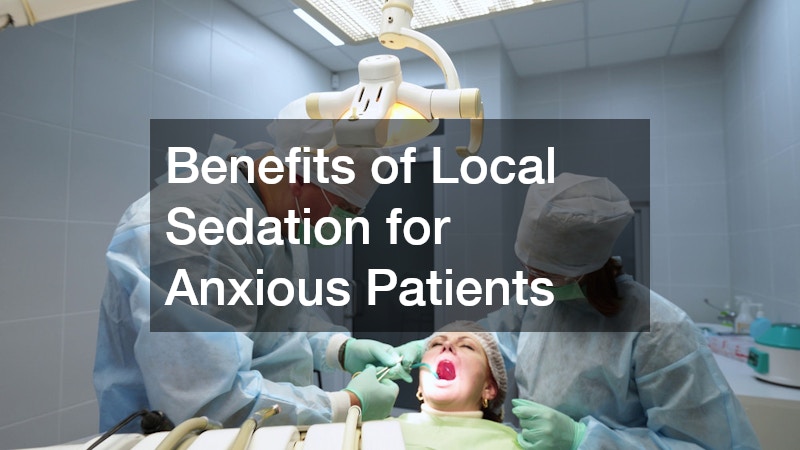Dental anxiety is a widespread issue affecting numerous patients worldwide. This growing concern has increased the demand for sedation dentistry as an effective solution. Local sedation dentists play a pivotal role in easing dental-related fears, providing patients with a more relaxed and comfortable dental experience.
Definition and Types of Sedation
Local sedation dentistry primarily focuses on minimizing discomfort during dental procedures by using sedatives. It is crucial to differentiate local sedation from general anesthesia, which renders the patient completely unconscious.
Local sedation typically involves methods such as nitrous oxide, oral sedatives, and intravenous sedation to ensure patient comfort.
Nitrous oxide, commonly known as laughing gas, is inhaled through a mask and provides mild sedation. Oral sedatives, taken in pill form, induce a more profound state of relaxation during the procedure. Intravenous sedation, administered directly into the bloodstream, offers the highest level of sedation while maintaining the patient’s ability to respond to the dentist.
The Role of Local Sedation in Modern Dentistry
In modern dentistry, local sedation has become a staple in enhancing patient care and comfort. The use of sedation enhances procedural efficiency by allowing dentists to perform complex treatments with ease. This approach minimizes patient movement and anxiety, resulting in a smoother workflow for both the dentist and the patient.
Patients who undergo dental procedures with local sedation often experience a significant reduction in their fear and restlessness. This newfound comfort encourages individuals to maintain regular dental visits, ultimately improving their overall dental health. Local sedation is not just beneficial during the procedure; it fosters long-term dental care habits as well.
Safety Measures and Regulations
The safety of sedation dentistry is a top priority, with stringent measures in place to protect patients. Sedation dentists follow strict protocols to ensure that each sedation type is administered safely and effectively. Regulatory bodies, such as the American Dental Association, provide guidelines that sedation dentists adhere to rigorously.
These guidelines encompass pre-sedation assessments, monitoring during the procedure, and post-sedation care. Sedation dentists must be well-versed in emergency preparedness and capable of managing any adverse reactions. Continuous education and training in sedation techniques and safety measures are mandatory for dental professionals.
Understanding Dental Anxiety
Dental anxiety is characterized by fear, stress, or worry before or during a dental appointment. This condition can result from past traumatic experiences, fear of pain, or even a generalized fear of medical procedures. If left unaddressed, dental anxiety can lead to neglect of oral health, exacerbating dental problems.
Patients with dental anxiety often delay or avoid necessary dental treatments, compromising their overall dental health. Chronic avoidance can result in more severe dental conditions, necessitating more invasive and costly procedures. Addressing dental anxiety is vital for promoting optimal dental health and preventing future complications.
Benefits of Local Sedation for Anxious Patients
Local sedation methods, like nitrous oxide and oral sedatives, are tailored to reduce anxiety and create a comfortable atmosphere for anxious patients. These techniques distract from the external stimuli, allowing patients to focus on relaxation rather than fear. As a result, patients can undergo dental procedures with minimal stress and maximum comfort.
Sedation dentistry offers a unique approach by providing a sense of calmness while maintaining patient consciousness. This level of sedation enhances the patient’s ability to receive necessary treatment without unnecessary emotional distress. The calming effects of sedation also reduce negative associations with dental appointments, enabling patients to maintain regular dental check-ups.
Consultation and Pre-Treatment Expectations
An initial consultation with a local sedation dentist is the first step towards a stress-free dental experience. During this consultation, patients should discuss their medical history, anxiety levels, and any specific concerns they may have. Open communication allows the dentist to tailor sedation techniques to the patient’s unique needs.
It is essential for patients to have realistic expectations about the sedation process and any possible side effects. The dentist will provide detailed information on what the patient can expect before, during, and after the treatment. A well-prepared patient is more likely to feel at ease, paving the way for a successful dental visit.
Post-Treatment Care and Follow-Up
After undergoing a dental procedure with sedation, post-treatment care is crucial for a smooth recovery. Patients are often advised to have a responsible adult accompany them home, especially if oral or intravenous sedation was used. Adhering to dietary and activity restrictions, as outlined by the dentist, aids in a quick and safe recovery.
Local sedation dentistry has emerged as a vital solution for individuals struggling with dental anxiety. By offering a tailored, compassionate approach, sedation dentistry helps patients overcome their fears and achieve better dental health outcomes. For those dealing with dental anxiety, exploring local sedation options could transform dental experiences into comfortable and manageable events, fostering a lifelong commitment to oral wellness.





